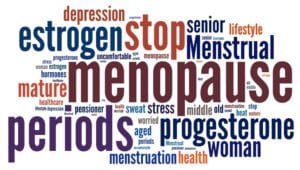Written by Taylor Woosley, Staff Writer. 2-month intervention of a twice daily capsule of 500 mg fennel and valerian extract significantly improved sleep quality (p = 0.03) and significantly lowered hot flash severity and frequency (p < 0.05).
 Women experience dramatic fluctuations during their lifetime in the levels of the sexual hormones estradiol, progesterone, and androgens when going through different stages of life, from menarche to menopause1. Menopause is clinically diagnosed when a woman has not menstruated for 12 months, which usually occurs around the age of 45-55 years2. Many women experience menopausal symptoms, including hot flashes, night sweats, insomnia, anxiety, and depression3.
Women experience dramatic fluctuations during their lifetime in the levels of the sexual hormones estradiol, progesterone, and androgens when going through different stages of life, from menarche to menopause1. Menopause is clinically diagnosed when a woman has not menstruated for 12 months, which usually occurs around the age of 45-55 years2. Many women experience menopausal symptoms, including hot flashes, night sweats, insomnia, anxiety, and depression3.
There are many approaches to managing symptoms related to menopause and many women are utilizing herbal products to reduce symptom severity4. Fennel has been used to alleviate hot flashes and strengthen the urinary system5. Additionally, valerian has been researched for its ability to reduce anxiety and depressive symptoms related to menopause, while also improving sleep quality6.
Jenabi et al. conducted a parallel group, randomized, controlled study to assess the efficacy of fennel and valerian in treating symptoms of menopause. Subject inclusion consisted of being a woman between the ages of 45-55 years, who were in their first year after menopause, who did not smoke, consume alcohol, or use herbal or hormonal therapies, with no history of estrogen-related cancers. 70 subjects were enrolled in the study and were randomized into either the fennel and valerian extract group (n=35) or the control group (n=35). Those in the fennel and valerian extract group consumed one fennel-valerian extract 500 mg capsule twice a day for 8 weeks. The control group consumed one oral placebo 500 mg capsule of starch twice a day for 8 weeks. All subjects completed weekly telephone calls and a questionnaire during the follow-up.
Hot flash severity, duration, and frequency was assessed using the Kupperman index before the intervention, and 4 and 8 weeks after the intervention. Sleep quality was assessed by the Pittsburgh Sleep Quality Index (PSQI). Student’s t test was utilized to compare continuous variables and the chi-square test was used for comparing categorical variables between the intervention and control groups. Both groups had similar ages, education levels, jobs, and marital status (p > 0.05). However, women in the fennel and valerian extract group had a significantly higher body mass index (BMI) (28.02 ± 4.22 vs. 25.13 ± 4.01, p = 0.005). Significant findings of the study are as follows:
- Subjects in the fennel and valerian extract group had a significantly lower PSQI score compared with the control after two months compared to the beginning of the intervention (p = 0.03).
- The intervention group experienced a significantly lower hot flash severity one and two months after the intervention (p < 0.05). Furthermore, significant differences were observed for frequency and severity of hot flashes between time points (p < 0.001). Significant differences were also observed between groups (p = 0.04 for frequency and p = 0.05 for severity).
Results of the study show that subjects in the fennel and valerian extract group experienced significantly lower PSQI scores after the two-month intervention compared to the control. Additionally, hot flash severity and frequency was significantly lower after two-months. Study limitations include lack of information regarding the participants’ diets, the small sample size, and short duration of the study.
Source: Jenabi, Ensiyeh, Salman Khazaei, Soodabeh Aghababaei, and Shirin Moradkhani. “Effect of Fennel-Valerian Extract on Hot Flashes and Sleep Disorders in Postmenopausal Women: A Randomized Trial.” Journal of Menopausal Medicine 29, no. 1 (2023): 21.
© by The Korean Society of Menopause
Click here to read the full text study.
Posted July 25, 2023.
Taylor Woosley studied biology at Purdue University before becoming a 2016 graduate of Columbia College Chicago with a major in Writing. She currently resides in Glen Ellyn, IL.
References:
- Gava G, Orsili I, Alvisi S, Mancini I, Seracchioli R, Meriggiola MC. Cognition, Mood and Sleep in Menopausal Transition: The Role of Menopause Hormone Therapy. Medicina (Kaunas). Oct 1 2019;55(10)doi:10.3390/medicina55100668
- Jeong HG, Park H. Metabolic Disorders in Menopause. Metabolites. Oct 8 2022;12(10)doi:10.3390/metabo12100954
- Avis NE, Crawford SL, Green R. Vasomotor Symptoms Across the Menopause Transition: Differences Among Women. Obstetrics and gynecology clinics of North America. Dec 2018;45(4):629-640. doi:10.1016/j.ogc.2018.07.005
- Khadivzadeh T, Abdolahian S, Ghazanfarpour M, Kargarfard L, Dizavandi FR, Khorsand I. A Systematic Review and Meta-analysis on the Effect of Herbal Medicine to Manage Sleep Dysfunction in Peri- and Postmenopause. J Menopausal Med. Aug 2018;24(2):92-99. doi:10.6118/jmm.2018.24.2.92
- Mahdavian M, Mirzaii Najmabadi K, Hosseinzadeh H, Mirzaeian S, Badiee Aval S, Esmaeeli H. Effect of the Mixed Herbal Medicines Extract (Fennel, Chamomile, and Saffron) on Menopause Syndrome: a Randomized Controlled Clinical Trial. J Caring Sci. Sep 2019;8(3):181-189. doi:10.15171/jcs.2019.026
- Jenabi E, Khazaei S, Aghababaei S, Moradkhani S. Effect of Fennel-Valerian Extract on Hot Flashes and Sleep Disorders in Postmenopausal Women: A Randomized Trial. J Menopausal Med. Apr 2023;29(1):21-28. doi:10.6118/jmm.22026
